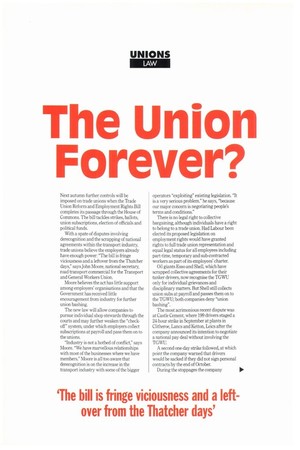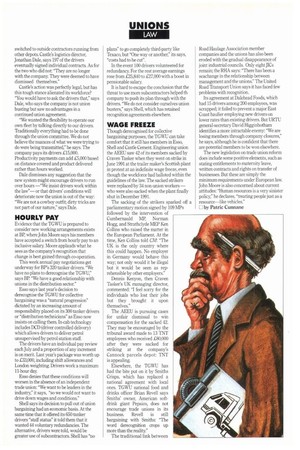The Union Forever?
Page 32

Page 34

If you've noticed an error in this article please click here to report it so we can fix it.
Next autumn further controls will be imposed on trade unions when the Trade Union Reform and Employment Rights Bill completes its passage through the House of Commons. The bill tackles strikes, ballots, union subscriptions, election of officials and political funds.
With a spate of disputes involving derecognition and the scrapping of national agreements within the transport industry, trade unions believe the employers already have enough power: "The bill is fringe viciousness and a leftover from the Thatcher days," says John Moore, national secretary, road transport commercial for the Transport and General Workers Union.
Moore believes the act has little support among employers' organisations and that the Government has received little encouragement from industry for further union bashing.
The new law will allow companies to pursue individual shop stewards through the courts and may further weaken the "checkoff" system, under which employers collect subscriptions at payroll and pass them on to the unions.
"Industry is not a hotbed of conflict," says Moore. "We have marvellous relationships with most of the businesses where we have members." Moore is all too aware that derecognition is on the increase in the transport industry with some of the bigger operators "exploiting" existing legislation. "It is a very serious problem" he says, "because our major concern is negotiating people's terms and conditions."
There is no legal right to collective bargaining, although individuals have a right to belong to a trade union. Had Labour been elected its proposed legislation on employment rights would have granted rights to full trade union representation and equal legal status for all employees including part-time, temporary and sub-contracted workers as part of its employees' charter.
Oil giants Esso and Shell, which have scrapped collective agreements for their tanker drivers, now recognise the TGWU only for individual grievances and disciplinary matters. But Shell still collects union subs at payroll and passes them on to the TGWU; both companies deny "union bashing".
The most acrimonious recent dispute was at Castle Cement, where 199 drivers staged a 24-hour strike in September at plants in Clitheroe, Lanes and Ketton, Leics after the company announced its intention to negotiate a national pay deal without involving the TGWU.
A second one-day strike followed, at which point the company warned that drivers would be sacked if they did not sign personal contracts by the end of October.
During the stoppages the company switched to outside contractors running from other depots. Castle's logistics director, Jonathan Dale, says 197 of the drivers eventually signed individual contracts. As for the two who did not: "They are no longer with the company They were deemed to have dismissed themselves."
Castle's action was perfectly legal, but has this tough stance alienated its workforce? You would have to ask the drivers that," says Dale, who says the company is not union busting but saw no advantages in a continued union agreement.
"We wanted the flexibility to operate our own fleet by talking directly to our drivers. Traditionally everything had to be done through the union committee. We do not believe the nuances of what we were trying to do were being transmitted," he says. The company pays its drivers £15,000. Productivity payments can add 15,000 based on distance covered and product delivered rather than hours worked.
Dale dismisses any suggestion that the new system might encourage drivers to run over hours —"We insist drivers work within the law"— or that drivers' conditions will deteriorate now the union is out of the way: "We are not a cowboy outfit; dirty tricks are not part of our nature," says Dale.
HOURLY PAY
Evidence that the TGWU is prepared to consider new working arrangements exists at BP, where John Moore says his members have accepted a switch from hourly pay to an inclusive salary. Moore applauds what he sees as the company's recognition that change is best gained through co-operation.
This week annual pay negotiations get underway for BP's 320 tanker drivers. "We have no plans to derecognise the TGWU," says BP "We have a good relationship with unions in the distribution sector."
Esso says last year's decision to derecognise the TGWU for collective bargaining was a "natural progression" dictated by an increasing amount of responsibility placed on its 300 tanker drivers or "distribution technicians" as Esso now insists on calling them. In-cab technology includes DCD (driver controlled delivery) which allows drivers to deliver petrol unsupervised by petrol station staff.
The drivers have an individual pay review each July and a proportion of any increment is on merit. Last year's package was worth up to £33,000, including shift allowances and London weighting. Drivers work a maximum 11-hour day Esso denies that these conditions will worsen in the absence of an independent trade union: "We want to be leaders in the industry," it says, "so we would not want to drive down wages and conditions."
Shell says its decision to pull out of union bargaining had an economic basis. At the same time that it offered its 650 tanker drivers "staff status" it told them that it wanted 44 voluntary redundancies. The alternative, drivers were told, would be greater use of subcontractors. Shell has "no plans" to go completely third-party like Texaco, but "One way or another," its says, "costs had to be cut".
In the event 100 drivers volunteered for redundancy For the rest average earnings rose from £25,840 to £27,000 with a boost in pensionable salary.
It is hard to escape the conclusion that the threat to use more subcontractors helped th company to push its plan through with the drivers. "We do not consider ourselves union busters," says Shell, which has retained recognition agreements elsewhere.
WAGE FREEZE
Though derecognised for collective bargaining purposes, the TGWU can take comfort that it still has members in Esso, Shell and Castle Cement. Engineering union the AEEU saw 42 of its members sacked by Craven Tasker when they went on strike in June 1991 at the trailer maker's Scottish plant in protest at an indefinite wage freeze, even though the workforce had balloted within the guidelines of the law. The sacked strikers were replaced by 34 non-union workers — who were also sacked when the plant finally shut in December 1991.
The sacking of the strikers sparked off a parliamentary motion signed by 109 MPs followed by the intervention of Cumbernauld MP, Norman Hogg, and Strathclyde MEP Ken Collins who raised the matter in the European Parliament. At the time, Ken Collins told CM: "The UK is the only country where this could happen. No employer in Germany would behave this way; not only would it be illegal but it would be seen as reprehensible by other employers."
Dennis Kenyon, then Craven Tasker's UK managing director, commented: "I feel sorry for the individuals who lost their jobs but they brought it upon themselves."
The AEEU is pursuing cases for unfair dismissal to win compensation for the sacked 42. They may be encouraged by the tribunal award made to 13 TNT employees who received £80,000 after they were sacked for striking at the company's Cannock parcels depot: TNT is appealing.
Elsewhere, the TGWU has had the bite put on it by Smiths Crisps, which has replaced a national agreement with local ones. TGWU national food and drinks officer Brian Revell says Smiths' owner, American softdrink giant Pepsico, does not encourage trade unions in its business. Revell is still bargaining with Smiths: "The word derecognition crops up more than the reality."
The traditional link between Road Haulage Association member companies and the unions has also been eroded with the gradual disappearance of joint industrial councils. Only eight JICs remain; the RHA says: "There has been a seachange in the relationship between management and the unions." The United Road Transport Union says it has faced few problems with recognition.
Its agreement at Dalehead Foods, which had 15 drivers among 200 employees, was scrapped; it failed to prevent a major East Coast haulier employing new drivers on lower rates than existing drivers. But URTU general-secretary David Higginbotham identifies a more intractable enemy: "We are losing members through company closures," he says, although he is confident that there are potential members to be won elsewhere.
The new legislation on trade union reform does include some positive elements, such as stating entitlements to maternity leave, written contracts and rights on transfer of businesses. But these are simply the minimum requirements under European law. John Moore is also concerned about current attitudes: "Human resources is a very sinister policy" he declares, "treating people just as a resource—like vehicles."
E by Patric Cunnane




































































































